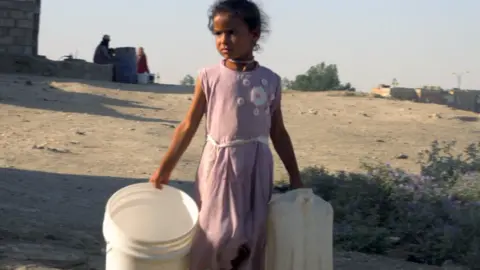 BBC
BBCTurkish air strikes in drought-struck north-east Syria have cut off access to electricity and water for more than a million people, in what experts say may be a violation of international law.
Turkey carried out more than 100 attacks between October 2019 and January 2024 on oil fields, gas facilities and power stations in the Kurdish-held Autonomous Administration of North and East Syria (AANES), according to data collated by the BBC World Service.
The attacks have added to the humanitarian crisis in a region reeling from a years-long civil war and four years of extreme drought exacerbated by climate change.
Water had already been scarce, but attacks on electricity infrastructure in October last year shut off power to the region’s main water station, in Alouk, and it has not been working since. On two visits there, the BBC witnessed people struggling to get water.
Turkey said it had targeted the “sources of income and capabilities” of Kurdish separatist groups it regards as terrorists.
It said that it was well known there was a drought in the area, adding that poor water management and neglected infrastructure had made things worse.
The AANES has previously accused Turkey of seeking to “destroy our people’s existence”.
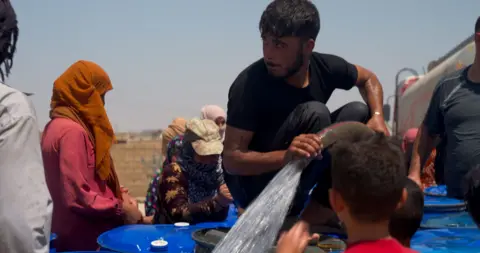
More than a million people in the Hassakeh province who once got their water from Alouk now rely on deliveries of water pumped from around 12 miles (20km) away.
Hundreds of deliveries are made by tanker each day, with the water board prioritising schools, orphanages, hospitals, and those most in need.
But the deliveries are not enough for everyone.
In Hassakeh city, the BBC saw people waiting for the tankers, pleading for the drivers to give them water. “Water is more precious than gold here,” said Ahmad al-Ahmed, a tanker driver. “People need more water. All they want is for you to give them water.”
Some people admitted they fought over it and one woman threatened: “If he [the tanker driver] doesn’t give me water, I’ll puncture his tyres.”
“Let me tell you frankly, north-east Syria is facing a humanitarian catastrophe,” said Yayha Ahmed, co-director of the city water board.
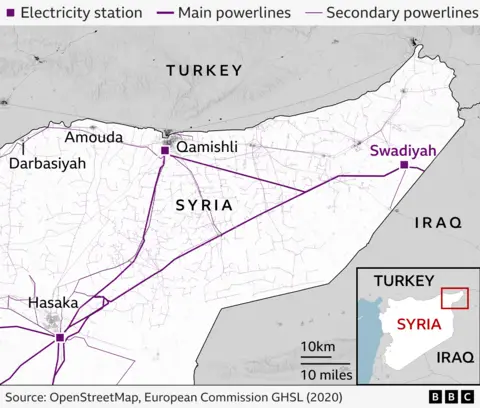
People living in the region have been caught up not only in Syria’s ongoing civil war but also in Turkey’s conflict with Kurdish-led forces, who established the AANES in 2018 after they – with support from the US-led coalition – drove the Islamic State (IS) group out of the region. Coalition forces are still stationed there to prevent a resurgence of IS.
Turkey’s President, Recep Tayyip Erdogan, has described the AANES – which is not officially recognised by the international community – as a “terror state” next to its border.
The Turkish government considers the Kurdish militia that dominates the main military force there to be an extension of the Kurdistan Workers’ Party (PKK) rebel group, which has fought for Kurdish autonomy in Turkey for decades.
The PKK is designated as a terrorist organisation by Turkey, the EU, the UK and the US.
Between October 2023 and January 2024, electricity transfer stations in three areas of the AANES were struck: Amouda, Qamishli, and Darbasiyah, as well as the region’s main power plant, Swadiyah.
The BBC confirmed the damage by using satellite imagery, eyewitness videos, news reports, and visits to the sites.
Satellite imagery of night-time lights from before and after the January 2024 attacks indicated a widespread power outage. “On January 18th…. a significant power outage is evident in the region,” said Ranjay Shrestha, a scientist at Nasa who reviewed the imagery.
The UN says Turkish forces carried out the strikes in Swadiyah, Amuda and Qamishli, while humanitarian groups say Turkey was behind the attack in Darbasiyah.
Turkey said it had been targeting the PKK, the People’s Protection Units (YPG) and the Kurdish Democratic Union Party (PYD).
The YPG is the biggest militia in the US-backed Syrian Democratic Forces and is the military wing of the PYD, the main political party in the AANES.
“Civilians or civilian infrastructure were not among our targets and have never been,” Turkey said in a statement to the BBC.
But in October last year, the country’s Foreign Minister Hakan Fidan said all “infrastructure, superstructure and energy facilities” that belong to the PKK and the YPG – especially in Iraq and Syria – were “legitimate targets” for its military, security forces and intelligence units.
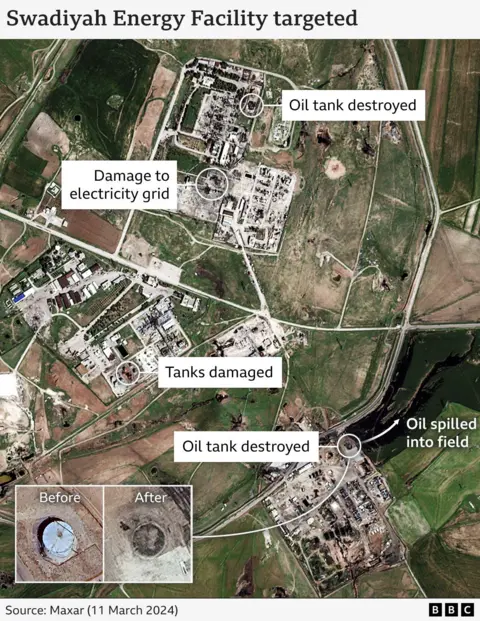
The consequences of the conflict have been compounded by climate change.
Since 2020, an extreme and exceptional agricultural drought has gripped north-east Syria and parts of Iraq.
Over the past 70 years the average temperature in the Tigris-Euphrates basin has risen by 2C (36F), according to European climate data.
The Khabour river once supplied Hassakeh with water, but levels became too low and people were forced to turn to the Alouk water station.
But in 2019, Turkey took control of the Ras Al-Ain area, where Alouk is situated, saying it needed to establish a “safe zone” to protect the country from what it described as terrorist attacks.
Two years after this, the UN raised concerns about repeated disruption of the water supply from Alouk to north-east Syria, saying the water supply had been interrupted at least 19 times.
And in February 2024 a report published by an independent UN commission said the October 2023 attacks on electricity infrastructure could amount to war crimes because they deprived civilians of access to water.
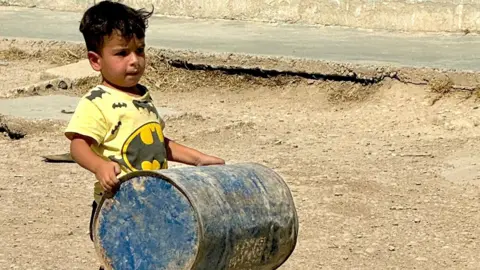
The BBC shared its findings with international lawyers.
“Turkey’s attacks on energy infrastructure have had a devastating impact on civilians,” said Aarif Abraham, a barrister at Doughty Street Chambers, adding: “This could constitute a severe violation of international law.”
Patrick Kroker, an international criminal lawyer at the European Center for Constitutional and Human Rights, said that “the indications that international law was violated here are so strong that they should be investigated by a prosecutorial authority”.
The Turkish government said it “fully respects international law”, adding that the UN’s February 2024 report provided “no substantiating evidence” for its “unfounded allegations”.
It blamed water shortages in the region on climate change and “long-neglected water infrastructure” maintenance there.
Hassakeh residents told the BBC they feel abandoned.
Osman Gaddo, head of water testing at the water board, said: “We have made so many sacrifices – so many of us died in battle. But nobody comes to rescue us. We are just asking for drinking water.”
Additional reporting by Ahmed Nour and Erwan Rivault

